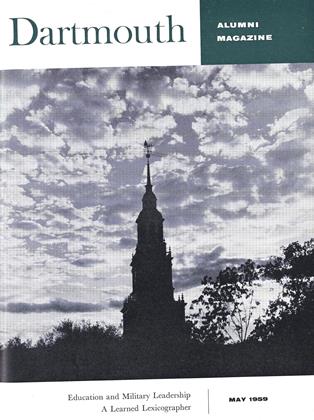Versatile Vermonter
GEORGE PERKINS MARSH of the Class of 1820 (LL.D. 1860) is the subject of a recent and interesting biography by David Lowenthal of the American Geographical Society.* The author became interested in Marsh through the latter's book, Manand Nature (N. Y.: Scribner, 1864), which Lowenthal calls "the most important and original American geographical work of the nineteenth century." In it, Marsh makes plain the case of the impact of man upon nature and the infinite ramifications of his actions on that order popularly called the balance of nature. The idea is commonplace now. In 1864 it was not, and Marsh laid the foundations of the work which has made it so. His conception that "nature is a quasi-organic unity added a new dimension to scientific insight." Thus we have a geographer turned biographer.
Marsh's most significant work may have been in the field of geography, but he excelled in many. He was a bright lad who entered Dartmouth in 1816 at the age of fifteen. He had grown up in Woodstock, Vermont, and had prepared for college at Phillips Academy, Andover. His upbringing was strictly Congregational which, despite its limitations, has produced some remarkable people. Mr. Lowenthal finds it hard to believe that it could or that the Dartmouth curriculum - restricted as it was to Latin, Greek, and mathematics; small doses of astronomy, natural sciences, and medical lectures; and massive applications of theology, metaphysics and political law - could possibly fit a young man for life. There is little use in flogging the dead horse of nineteenth-century pedagogical backwardness with twentieth-century progressivism when Dartmouth could produce a Daniel Webster, a George Ticknor, a Rufus Choate or a George Marsh within a period of twenty years.
Marsh became in due time a lawyer, businessman, Congressman (one of those who molded the incipient Smithsonian Institution), the leading American philologist of his time, lecturer, etcher of glass, and the collector of the finest assemblage of Icelandic materials in America, which in 1959 is one of the most significant in the country. He wrote assiduously. The bibliography of his published works extends for 24 pages. Finally, he was a diplomat.
He was appointed United States Minister to Turkey in 1849. A change of administration in 1853 brought Franklin Pierce to the Presidency and sent George Marsh home. Even had Pierce been born in Vermont, as Mr. Lowenthal believes, it would have made no difference, for Marsh was a determined Whig in those halcyon days of political patronage when Whigs were doomed. He arrived home bankrupt, and for the next seven years he struggled along as a lecturer and as a lobbyist for his Congressional bill to repay certain expenses he had incurred while in Turkey.
The end of his troubles came in 1861 when Lincoln appointed him Minister to the newly formed Kingdom of Italy. Here Marsh served for the remainder of his life, becoming in those 21 years the dean of American diplomats. He died, aged 81, at Vallombrosa, Italy, on July 23, 1882, and was buried in the Protestant cemetery in Rome.
Lowenthal's book, though marred by a few small errors of fact and by some larger misunderstandings of eighteenth and nineteenth century American life, is, nonetheless, a thorough and absorbing biography of a remarkably versatile man.
*George Perkins Marsh: Versatile Vermonter. New York: Columbia University Press, 1958 442 pp., illus. $6.50.
 View Full Issue
View Full Issue
More From This Issue
-
 Feature
FeatureGove (gōv), Philip (fĩl'ìp) B.
May 1959 By JAMES B. FISHER '54 -
 Feature
FeatureDartmouth Study Urges ROTC Program Changes to Meet Nation's Needs
May 1959 By JOHN HURD '21 -
 Feature
FeatureFourteen Gained — Three to Go
May 1959 -
 Feature
FeatureWar Memorial Planned in Center
May 1959 -
 Article
ArticleTHE FACULTY
May 1959 By HAROLD L. BOND '42 -
 Class Notes
Class Notes1915
May 1959 By PHILIP K. MURDOCK, JAMES LeR. LAFFERTY










